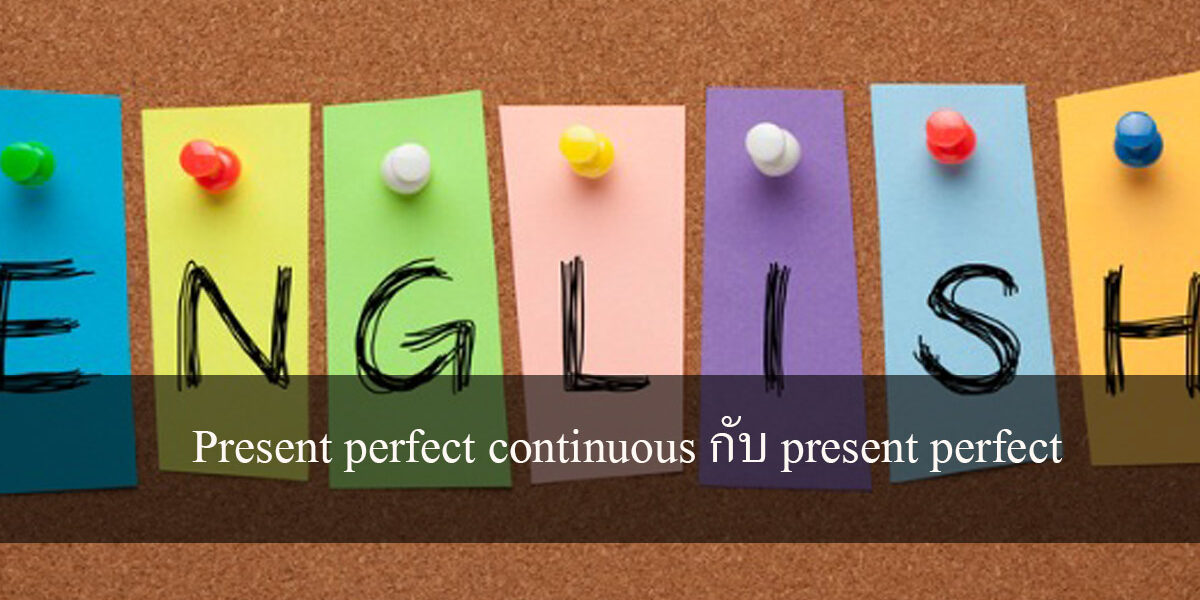Present perfect continuous กับ present perfect
– We have been living here since 1987.
= We came here in the past and we are still living here now.
= She’s still waiting now.
– I‘ve been studying English for eight years.
= She’s still studying English now.
– James has been painting that door since three o’clock and he hasn’t finished it yet.
หมายเหตุ เหตุการณ์ ทั้งหลายเหล่านี้ยังไม่เสร็จสิ้นลง
– The workmen have been digging up the raod and now the traffic cannot pass.
– What have you been eating? Your lips and chin are purple.
– We have been driving along muddy roads and now the car is dirty.
– He has been drinking and can’t walk straight .
– He has been studying all night and has fallen aslep in class.
|
โครงสร้าง
|
Subject + has/have + been + V.-ing
|
||||||||||||||
|
ประโยคบอกเล่า |
I / You / We / They | have | been | working | in the office. | ||||||||||
| He / She / It | has | been | watching | the television. | |||||||||||
|
โครงสร้าง
|
Subject + has/have + not + been + V.-ing
|
||||||||||||||
|
ประโยคปฏิเสธ |
I / You / We / They | have | not | been | working | in the office. | |||||||||
| He / She / It | has | not | been | watching | the television. | ||||||||||
|
โครงสร้าง
|
Has/Have + Subject + been + V.-ing?
|
||||||||||||||
|
ประโยคคำถาม |
Have | I / you / we / they | been | working | in the office? | ||||||||||
| Has | he / she / it | been | watching | the television? | |||||||||||
|
โครงสร้าง
|
Who/What/Where/When/Why/How + has/have + Subject + been + V.-ing?
|
||||||||||||||
|
ประโยคคำถาม |
Who | have | I / you / we / they | been | talking to? | ||||||||||
| Where | has | he / she / it | been | sleeping? | |||||||||||
S + has/have + V3
หลักการใช้
1. ใช้กล่าวถึงเหตุการณ์ที่เกิดขึ้นในอดีต และยังดำเนินหรือมีผลต่อเนื่องมาจนถึงปัจจุบัน มักมีคำว่า since และ for อยู่ด้วย
2. ใช้กล่าวถึงเหตุการณ์ที่เพิ่งกระทำเสร็จสิ้นใหม่ๆ จะมีคำว่า just , recently (=lately ) = (not long ago) และ
lately ใช้กับประโยคคำถามและปฏิเสธ
– Have you finished your assignment?
– Yes, I have just finished it.
– The results have just been announced.
– He has recently got married.
– Have you been there lately?
3. ใช้กับคำว่า yet และ already
yet (ยัง) ใช้กับ Question , Negative Answer และ Negative Statement
already (เรียบร้อยแล้ว) ใช้กับ Affirmative Statement และ Affirmative Answer
– We have not yet read that book. (Neg. St.)
– Has he come back yet ? (Question)
– No, he has not come back yet. (Neg. Ans.)
– Yes, he has already come back.
– Yes, he has come back already.
**** already เมื่อเป็นการแสดงความประหลาดใจของผู้พูดจะใช้ในประโยคคำถาม
– Have you finished your report already?
4. ใช้กล่าวถึงเหตุการณ์ในอดีตและยังไม่จบในขณะที่พูด จะมีคำว่า ever , never
ever ใช้กับ Question
never ใช้กับ Negative Statement และ Negative Answer
– Have you ever been to America? (Question)
– No, I have never been there. (Neg. Ans.)
– Yes, I have been there .
– I have never palyed ice-skating. (Neg, St.)
5. ใช้กล่าวถึงเหตุการณ์ที่เกิดขึ้นในอดีต แต่ไม่ได้บ่งเวลาที่เกิดขึ้นให้ชัดเจน จะมีคำว่า up to the present time ,
until now , so far , so far this month , at last,
– Up to the present time we have had no news from John.
– I have received no answer from him so far.
– He has finished his report at last.
6. ใช้กล่าวถึงเหตุการณ์ที่เกิดซ้ำซากหลาย ๆ ครั้ง จะมีคำว่า many times, several times , over and over
– I have been to Hua-Hib many times.
– She has seen “Jurassic Park” several times.
– We have studied Tenses over and over.
7. ใช้กล่าวถึงเหตุการณ์ในอดีตที่สิ้นสุดลงแล้ว แต่เกี่ยวเนื่องกับเหตุการณ์หนึ่งซึ่งเกิดขึ้นในปัจจุบันหรืออนาคต
– Janet has bought a car so that she will have transportation to work.
– He has studied all day so that he can go to the dance tonight.
8. ใช้กับเหตุการณ์ที่เกิดขึ้นในช่วงระยะเวลาหนึ่ง ซึ่งยังไม่สิ้นสุด จะมีคำว่า this month , this year
– Have you had a holiday this year?
– You have done a lot of work this morning.
– I have read two books this week.
9. ใช้ในบทสนทนา จดหมาย รายงาน หนังสือพิมพ์
Conversation — I have lost my keys. Have you seen them? Yes, I have seen them.
Yes, I saw them yesterday. (ถ้ามีเวลาบอก ใช้ past simple)
Letters – — Dear James,
I’m sorry that I haven’t written to you for such a long time but I have been
very busy working for an examination.






